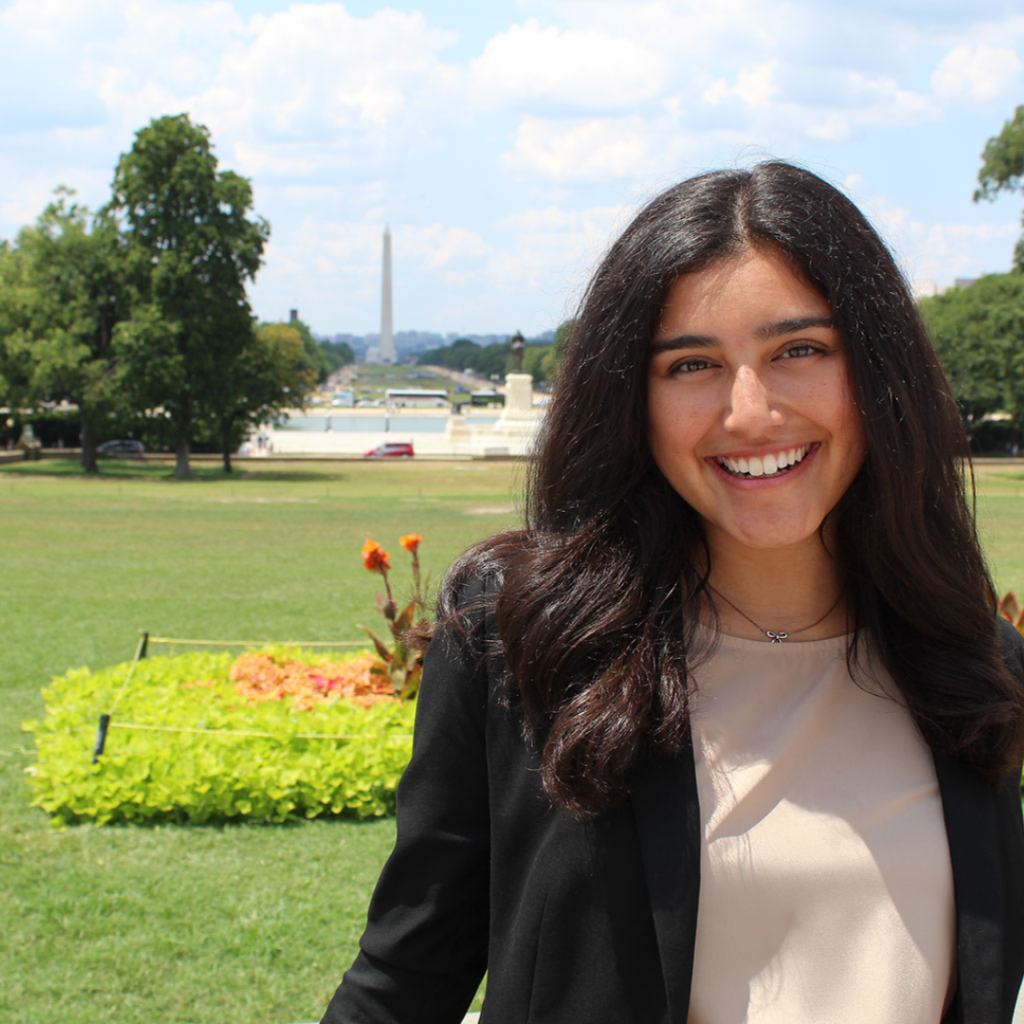Student Blog Post: Emily Prest
My Experience with the Georgetown University’s Collaborative on Global Children’s Issues
by Emily Prest (G’23)
As a bright-eyed, incoming graduate student at Georgetown, I knew that having the university and the greater Washington D.C. area as my playground would bring ample opportunity while I stepped into my next level of training towards becoming an environmental steward. Fresh off the heels of obtaining my Bachelor of Science in Environment and Sustainability from Cornell University and with a 2019 House of Representatives Select Committee on the Climate Crisis internship under my belt, I was excited to expand my knowledge on my undergraduate research interests on how to best protect communities in the face of environmental injustice alongside my Master’s studies in Environmental Metrology and Policy, my search for a meaningful and engaging experience that would allow me to work directly with movers and shakers outside of my academic course load led me straight to the newly launched Collaborative on Global Children’s Issues.
Established in the Fall of 2021, the Collaborative on Global Children’s Issues works towards addressing pressing issues the children of our world are facing via cross-disciplinary research and dialogue. It was conversations with the Collaborative’s director, Gillian Huebner, and senior fellow, Dr. Joan Lombardi, that energized and inspired me to work towards securing a clean, safe, and healthy environment for the children of today and tomorrow.
I had the privilege of being a part of the inaugural cohort of the Collaborative’s student fellows program in the Spring of 2022, where I worked alongside Dr. Joan Lombardi — who in addition to being a senior fellow with the Collaborative, also served as the first Department of Health & Human Services Deputy Assistant Secretary for Early Childhood and the first Director of the Child Care Bureau — in researching the impact of climate change on children and what steps are being taken to protect them. It was in our literature research where we found ourselves facing jarring statistics, such as the fact that 1 billion children are at “extremely high risk” of climate change impacts; that conflict, climate change, and natural disasters forcibly displaced an estimated 30 to 34 million children in 2019; and that an estimated 16 million children are at emergency levels of food insecurity resulting from climate change in East and Southern Africa.
We found ourselves joining in frustration that children are of the most vulnerable groups to the developmental and social ramifications of climate change, yet lack the political power to prescribe change directly within government systems. It was then that we decided to look into the role of youth activism in the fight against climate change. We found that children and youth across the world are securing their seat at the table and adopting a prominent role in climate activism. From youth-led climate focussed organizations like Fridays for Future or Extinction Rebellion Youth, to the participation of youth in climate literacy, children and youth have taken strides in calling on world leaders to better secure the safety and well-being of many generations to come.
During my fellowship, I was able to participate in discussions with leading international childhood development organizations, such as the Global Fund for Children and the Africa Early Childhood Network, on the importance of climate change in the realm of early childhood development. I also had the opportunity to draft and collaborate on pieces relating to children and climate change, including: a call to action with the Africa Early Childhood Network, a guest blog post with the Global Fund for Children on youth climate action, and an article for Georgetown University’s Common Home Magazine entitled, “Safeguarding the Future Generation.”
Following my time with the Collaborative, I remain dedicated to continuing my work in the space of climate change and children. In the Summer and Fall of 2022, I interned with the Environmental Protection Agency’s Office of Children’s Health Protection (OCHP). Here, I was able to learn more about the federal government’s role in advocating on behalf of children facing the threat of climate change, and also provide recommendations to OCHP staff relating to their climate programming. Further, in February 2023, I will be co-hosting a workshop entitled “Children and Changemaking in the Midst of a Climate Crisis” as part of the Collaborative’s Children in a World of Challenges Workshop Series. During the workshop, we will discuss the climate impacts on children and the role that youth play in climate activism, and there will be opportunities for workshop participants to reflect on their own experiences with the climate crisis.
There is no doubt that my fellowship with the Collaborative on Global Children’s Issues left a lasting impression on me. It is clear that our future generations will unjustly bear the greatest burdens associated with climate inaction, and it is our responsibility to do our best to help ensure that these children are granted the healthy environment they deserve. It is this fellowship, and the EMAP program, that is bringing me one step closer towards becoming the environmental advocate for our future generations that I aspire to be.

